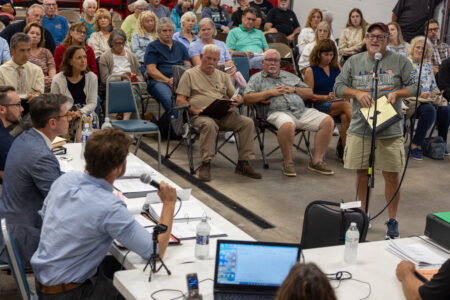State law seeks neutrality in municipal hearings
Muncy Creek Township supervisors must remain neutral as they review testimony and evidence presented at the conditional use hearings for a large concentrated animal feeding operation and solar farm.
Township supervisors, based on the Pennsylvania Municipalities Planning Code for conditional use hearings, must remain objective.
According to Pennsylvania Municipalities Planning Co. and rules for conditional use hearings, supervisors don’t have the leeway, as that of the average person, to add their ad hominem comments.
Essentially, supervisors are required to review an application for a property use that is permitted in a zoning district, provided it meets “specific criteria outlined in the zoning ordinance,” said Victor Marquardt, zoning officer, with Code Inspection Inc., Montgomery. Code Inspection Inc. is a third-party company that serves Lycoming, Northumberland and Clinton counties.
Marquardt has nine years of zoning officer experience and said he has seen a lot of plans and projects. He admitted in an interview that this is one of the largest. Marquardt, who said he also will testify, has provided zoning service in 20 to 23 municipalities in Lycoming, Clinton and Northumberland counties.
“I have seen a lot of projects in a lot of places,” he said, adding this is one of the larger and unique in that it is an agrivoltaics – a combined CAFO and solar.
Additionally, the township planning commission “has regulatory authority, which is rare,” Marquardt said.
Legal counsel has been present at the conditional use hearings to ensure the law is followed, and the public at the meetings has exhibited decorum, for the most part, with moments when noise has hindered the ability of the court reporter to hear the evidence presented.
Purpose of these hearings
Namely, though, the core of a conditional use hearing purpose is determining if the proposed use meets the explicit criteria listed in the local zoning ordinance, according to the rules in Pennsylvania Municipalities Planning Code.
The hearings are needed because of the proposal by Lancaster County-based companies – Bollinger Solar LLC to construct an 11 section solar array producing 33 megawatts of electricity to connect to PPL interconnection, and Ag Ventures LLC., which would operate a CAFO that would consist of five large barns, each housing about 70,000 free-range chickens, or 350,000 chickens on the farm, many of them laying eggs that would be taken by truck and sold at stores, including Sam’s Club, said Cody Wagner, a manager of Ag Ventures. The joint venture is with the Bollinger and Wagner families.
Here’s where there may also be a misunderstanding among some in the public: The township ordinance allows for CAFOs in the agricultural district, as a conditional use, Marquardt said.
“They have to meet all the criteria of the conditional use,” he said.
The hearing must be held on the plan before it would go to a land development planning phase, he said.
On the solar project, the township ordinance did not – until recently – regulate solar, which was a “use not provided for” when Bollinger applied for the permit in the agriculture district, Marquardt noted.
That was the status of the ordinance, but it was amended over the summer and adopted by the board to include conditions that add a layer of protection for those living near solar farms, Marquardt agreed.
More on supervisors’ role
Unlike a typical legislative meeting, the supervisors in the conditional use hearing act as judges, hearing evidence from the applicant and any objectors to make a decision based on the “facts and law, rather than public opinion or bias.”
In the initial meeting, Supervisor Eric Newcomer, chair, and J. Michael Wiley, township solicitor, outlined the process and what is expected.
For the applicants, there are criteria to satisfy conditional use in the ag zone, and they are referred to in the zoning ordinance under Section: 1102.4. There are seven principal conditions and seven sub-conditions. Typically, municipalities will make their zoning ordinance look like what is in the Pennsylvania Municipalities Planning Code, he said.
Meanwhile, the applicants, who are there with their counsel, Attorney Samuel Wiser, of Salzmann Hughes, present evidence that they meet the conditional use requirements set forth in the township zoning ordinance.
As part of the hearings, the applicants provided and continue to give documentary evidence (plans, reports) and testimony to attempt to show that their project meets zoning requirements.
The hearings get into the nuts and bolts and specifics and involve audience participation with people asking questions of the applicants as part of the overall record of the proceedings.
Supervisors, meanwhile, can attach what are known as “reasonable conditions” to an approval to safeguard the public, but these conditions cannot benefit a particular party, according to the rules for the hearings.
In laymen’s terms, an example of that might be if someone is concerned about glare from solar panels, the supervisors can put a condition that requires trees at least 15 feet high at maturity planted so many feet apart, Marquardt said.
“But supervisors can’t put a condition on which benefits the applicant,” he said.
Once the hearings are over, and the record is closed, the supervisors intend to make a decision to either grant, deny, or grant with conditions, and each of the projects is a separate condition.
Each project is subject to separate conditions.
“I presented it as two separate projects – solar and CAFO,” Marquardt said.
Now, if they so choose, the board can put conditions on that would affect the solar or the CAFO.
After the written decision there is a period of time that allows for a right to appeal to the Lycoming County Court system, Marquardt added.
For example, should the applicant be denied the applicant has the ability to appeal it to the county court level.
Conversely, if the board approved the project the neighbors can appeal within 30 days to court, or if the applicant is upset with the conditions put on the project, they can appeal that to the county court level.
Throughout the process, Zachary DuGan, of Percibelli & Williams, Williamsport, has spent time cross-examining and asking questions of the applicants as counsel for the Coalition.
The coalition is a citizens’, grassroots organization that formed as a result of the applicants’ proposal. Many of the members live close to or in sight of the project but not all. The group has paid for experts in various fields to provide testimony at the hearings. The group has crafted handmade signs that are brought to the meetings at the fire company, and are situated on properties that permit them. The coalition also has an active Facebook site, which provides regular postings including medical and scientific study results of CAFOS and solar panel farms.
The neighbors are primarily concerned about the increased truck traffic and safety for school children and general public, potential pathogens in the air and soil, groundwater effects on nearby wells, property values, increased potential for health impacts such as influence on those with asthma, and the general odor from the chicken manure, flies that accumulate at CAFOs, and glare and noise living near a solar farm of this magnitude.
Adding a twist to the mix, Supervisor Gary Phillips was asked to recuse himself and can’t vote on the matter due to a comment on Facebook.
That left, in the summer, the board with Newcomer – as Daniel Whitmoyer – resigned as supervisor. Coalition members urged Phillips and Newcomer to appoint another supervisor, and, after an executive session, Phillips and Newcomer voted to appoint Harley Fry II, interim as temporary supervisor, so the meeting schedule could continue and not be disrupted. This was a meeting at the township building not part of the conditional use hearings.
Frey, who was the nominee for the Republican and Democratic parties in the primary election, agreed to review the transcripts because he had not been able to attend all of the conditional use hearings.
These CAFO conditional use hearings typically have resulted in standing room only at the Muncy Area Volunteer Fire Co. on East Penn Street.
The next solar project conditional use hearing at the fire hall is at 7 p.m. on Sept. 30.



